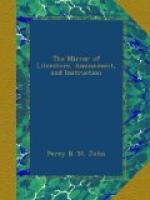The sepulchre of Virgil, it may be imagined, must have long remained an object of interest and veneration, especially as his works had excited universal admiration even in his life-time, and were very soon after his death put into the hands of children, and made a part of the rudiments of early education. Yet Martial declares that it had been neglected in his time, and that Silius Italicus alone restored its long forgotten honours.
The reader will learn with regret that Virgil’s tomb, consecrated as it ought to be to genius and meditation, is sometimes converted into the retreat of assassins, or the lurking place of Sbirri. Such at least it was the last time we visited it, when wandering that way about sun-set we found it filled with armed men. We were surprised on both sides, and on ours not very agreeably at the unexpected rencounter; so lonely the place and so threatening the aspects of these strangers. Their manners however were courteous; and on inquiry we were informed that they were Sbirri, and then lying in wait for a murderer, who was supposed to make that spot his nightly asylum. It would be unjust to accuse the Neapolitans of culpable indifference towards this or any other monument of antiquity; but it is incumbent on the proprietor or the public, to secure them against such profanation. On the whole, few places are in themselves more picturesque, and from the recollection inseparably interwoven with it, no spot is more interesting than the tomb of Virgil.
* * * * *
LAST CHRISTMAS DAY.
(For the Mirror.)
“Say, if such blandishments did
ever greet
Thy charmed soul; hast thou not crav’d
to die?
Hast not thine immaterial seem’d
but air
Verging to sigh itself from thee, and
share
Beatitude? hast thou not watch’d
thy breath
In meek, faint hope, that soon ’twould
sink in death?”
MS. Poem.
Last Christmas Day! my heart leaps with joy at its very memory; it was a mental Noel, a Christmas of the soul, (if I may thus express myself.) That which I am about to relate of it is strictly true, and I do relate it because that day is one of the very few in our brief existence which form a moral epoch in, and influence subsequent, life. Last Christmas Day, I well remember, my spirit revelled in an Eden blessedness—a bliss which the unholy world did not, could not, give, and consequently could not take away. Reader! I will hope, I will believe, that thou hast experienced feelings and emotions, like those high and holy ones of which I would endeavour now to preserve a faint transcript. Come then, let us unite our ideas, let us speak together, but let us yet mention as present, those beatific thoughts and imaginings which are indeed past. Let us ever remember and cherish in our heart of hearts those golden fore-tastes of future eternity, or (according




